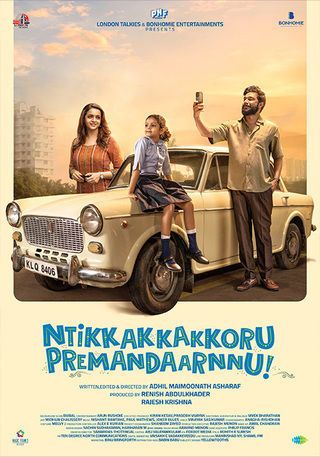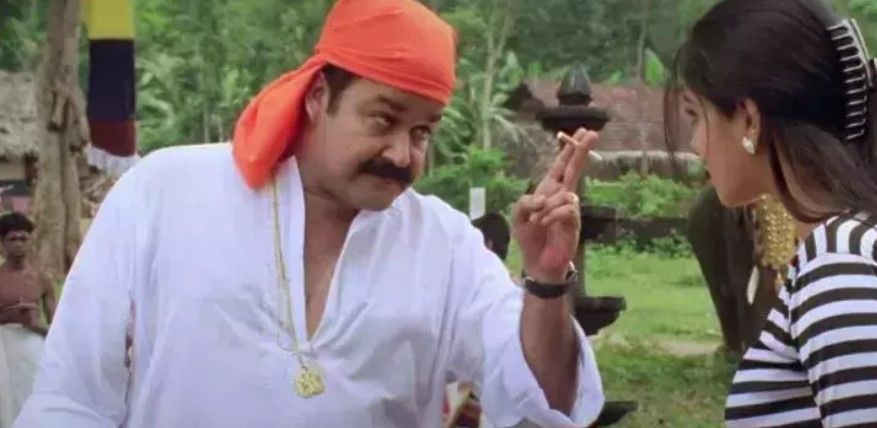Ntikkakkakkoru Premandaarnnu: The Return of Bhavana, and the Political Imagination
The film Ntikkakkakkoru Premandaarnnu (My brother had an affair) expresses manifold ideas in explicit and implicit modes of storytelling. On the face of it, it has all the predictable elements of a feel-good film. But, there are several factors that add historical dimensions to it and make it a film that needs to be supported and spoken about. The first factor is that it is the vehicle for the return of the talented Malayalam actor, Bhavana, to the Malayalam movie scene again after a gap of five years. That fact by itself needs to be celebrated. Beyond that, the film has more to it in terms of treatment and presentation. In the process, the film presents a candid theme highlighting simple joys and merriments of life but still connects with the changing Malayalee ethos. 
Promotional Poster of Ntikkakkoru Premandarnnu
Evidently, its title is a parody of the famous short story ‘Ntuppappakkoru Aanendarnnu’ (My grandfather had an elephant) written by the legendary Malayalam writer, Vaikom Muhammad Basheer. The filmmaker must have chosen this title to lighten the mood of the audience and avoid a sense that the movie is characterised by high-strung emotions. When the same title becomes part of the storytelling by Mariyam (a smart little girl portrayed by Saniya Rafi) in the movie, her natural and spirited acting, combines with the charm of characterization, and elevates the meaning of the movie to a new level. The children in this movie have in them a whole world of cuteness, yet they come across as unique individuals. Only in rare movies such as this does one get the relief of watching kids being kids, not being turned into miniature/bonsai replicas of grown-ups.
‘Muslim Social’
Primarily, the premise of the movie is akin to one which several mainstream movies of the Malayalam film industry have adopted as their own. This stream is often referred to as ‘Muslim Social’. However, the religious and family setting of the heroine Nitya (Bhavana) is of Hindu middle class. In that sense, this film faces straight on allegations of ‘Love Jihad’ that the Hindu fascist forces have brandished rabidly to attack Kerala society and its secular values. In other words, the director retains the new-generation sensibility of self-criticism to sieve in a politically correct positioning throughout. One must remember Malayalam flicks such as Kilichundan Mambazham, which were products of the script writer-director partnership of Sreenivasan and Priyadarshan and which got reviews exposing its anti-Muslim abhorrence and mockery. Such comparisons and discussions would help one understand the openness and maturity of Ntikkakkakkoru Premandaarnnu.
At the same time, this movie also rejects the construct that presents the combination of Mappila (Muslim) and Malappuram (Malappuram district) as a monolithic idol. The film also traverses beyond other celebratory cliches of Malayalam cinema such as Malappuram as the land of the kindness tree, Fort Kochi as the underworld of Kerala, and Ottappalam as the stereotypical geography of feudal arrogance. It also rejects the approach of the famous anecdotal statement from an early Malayalam novel, ‘adiyan lachippom’, meaning, ‘let me, your servant, come to your rescue right now!’ Such stereotypes are rejected outright in the film.
Bhavana’s Redebut
The story is set in Irinjalakkuda and Kodungallur, both minor towns in Thrissur district of Kerala. Incidentally, the heroine, Bhavana, hails from this area. Considering that this actor was banished from Malayalam film industry for obvious reasons – as she fell victim to an unparalleled sexual harassment ordeal allegedly inflicted by the hired goons of a Malayalam superstar to satiate his sense of revenge – her redebut in a story that manifests the representative quality of her local cultural roots, is quite endearing.
The movie’s main is on the physical and mental reactions of individuals in the face of relationships that turn toxic. When bondings of love, blood, friendship and marriage (in their legality and seemingly unbreakable sanctity), turn into breeding grounds of hegemony, servility, and masochist tendencies, human life sinks into deep misery. What the heroine Nitya (Bhavana) faces is this lethal life situation.
 Bhavana
Bhavana
The film does not directly depict any physical or mental forms of violence with respect to the heroine’s domestic life. It just tells the story of that violence without showing any act of violence. Yet, the audience can experience the reality of it in its entirety; because, each of them might have experienced the way in which relationships transform into bondages and the cruelty that power can inflict on individuals in their day to day lives. When a memory is retold as how the husband locked Nitya up in the bathroom throughout the night, while he and his parents had had their dinner and a good night’s sleep, the pain that this re-tell infuses in our minds is beyond words.
Malayalam Cinema as a Graveyard for the Female Self
At an indirect and suggestive level, the film’s narrative as well as the parallel real life story of Bhavana intermingle to reflect the stark underbelly of Malayalam cinema. At this level, it has acquired a monstrous quality. This character has come up along with the many successes it has had, growing with the same strength in market- driven film structures as well as subaltern circles. In the process, it has also developed into a fortress of oppression reinforced by the hegemonies of gender, class, race, religion, caste, money, and language; and within its fabulous and pleasing visual folds, it has submerged, silenced and annihilated many lives and life situations of the marginalised. In reality, Malayalam movies are also about a rotten geography where the body, self, history, nature, freedom, self-respect, security, safety, livelihood, and survival of the female has been crushed to the ground; and it has befallen her as a graveyard. Though many have imagined Malayalam cinema as an entity of pride, this morbid streak cannot be ignored or wished away. And that is exactly why I am forced to remap the Malayalam silver screen as a toxic bioweapon too that has bestowed upon us a shameful legacy.
This overwhelming power structure and its effects are crafted and cultured through the themes, interpretations, propaganda, and the praise of a hegemonic consensus. They have been sharpened and hardened by constantly using them to flay critics, experimental filmmakers and new generation directors. From time to time all these are sought to be glossed over as mere practical jokes from a ‘big brother’. However, what is revealed in bits and pieces about Malayalam cinema is also that it had its own brutal rules inside its high-walled fortress where it indulged in an orgy of exploitation, harassment, murder, rape, quotation jobs, sex hunts, and criminalism, all presumed to be and passed of as the order of the day and the law of the land. Behind the facade of the umpteen cinema-related organisations and collectives numbering about hundred, the many-shaded oppressors keep up their appearances as judge, jury and executioner, all rolled into one.
In such a context one would not have to struggle too much to answer the question as to what Kerala should not become in the 21st century. The answer can be as simple as this: it just should not (NOT) be like the Malayalam cinema industry. The mainstream branch of Malayalam cinema all these years and decades has been creating such cultural pollution, so rotten, inhumane, misogynistic, ahistorical, fascist, and revisionist.
Malayalam cinema had survived crisis after crisis, overcome adversities and spread its branches only because of the fact that for long periods in its existence as a cultural-commercial- industrial-media-technology conglomeration, it represented the pride of Malayalam language and a united Kerala state. As the renowned poet K.G. Sankara Pillai wrote famously in one of his poems, the sea had gotten this big by being looked upon constantly and looked upon by all. There was indeed so many limitations and so much of decadance. Still, the popularity of the movies sustained it, as it soared high to overcome all these hurdles and vices and is viewed as passionate representations of a modern localism, an assertive Keralite/Malayalee notion of self pride. It will remain so in future too. However, recent revelations point to the tendencies that fill every Malayalee with an apprehension that this art form and its expression in Kerala is creating an inextricably lethal problem for all of us. This has also literally shocked many who realised for the first time what is happening in the glamourous and filthy rich world of Malayalam movie industry.
While travelling in a vehicle provided by the representative of the film producer from the shooting location to her home, Bhavana, a mainstream female actor in Malayalam cinema was nastily attacked, sexually harassed, and threatened in a planned act of violence. As our society is shadowed by common misogynistic perceptions and even remedial systems, moulded as they are by the power equations of male hegemony, are marred by the same, the usual narrative of these incidents would have been that of the survivor swallowing the hurt and insult caused by the act and keeping silent while the crime is swept under the carpet. As the female actor in this incident showed the courage to file a police complaint and stood strongly by it even under pressure, the accused were arrested.
An Indecent Association
The police sources have publicly stated that this act of violence was commissioned by a superstar of the Malayalam film field as a hired ‘quotation’ job for a goonda. Until the accused were nabbed by the police, the so-called actors’ association was just his obedient lackey. The organisation has taken a similar stand in yet another sexual harassment complaint filed recently. Through this abhorrent drama, this organisation has sunk to a position as the most indecent and vulgar of all the people collectives of Kerala.
In common perception, an organisation is expected to have at least three tiers of responsibility. The first and foremost responsibility is towards its own members. No further proof is needed to note that this organisation does not keep that responsibility. Not only did it not show any sympathy or support to the attacked female actor, who also happens to be its member, it also supported and stood with another superstar who publicly disowned the survivor for not coming forward to refute publicly the allegations against the accused actor. Even the elected people’s representatives who were among the organisation’s leadership threatened and insulted the journalists who raised doubts and questions.
The second responsibility of an organisation is towards its industry domain. This organisation does not seem to have any sense of responsibility towards either the art form, or to the industry that thrives around it. Film directors such as Ashiq Abu, Amal Neerad, and Anwar Rasheed had in the past alleged that its leadership had been inside the deep pockets of those who tried to crush and demolish the new generation directors like them. It also had brandished the sword of industry-wide ban before well-known figures in the movie industry such as Tilakan, Vinayan, and Prithviraj who disagreed with them.
The third responsibility of such an organisation is towards the society at large. Kerala has in the recent past not seen such an organisation and leaders who have been this pathetic in addressing the concerns of the civil society regarding their actions.
 Still from the movie Kasabah
Still from the movie Kasabah
Chauvinistic Heroes
We are talking here about the heroes of hundreds of movies that came out in the last ten years or so who filled the silver screen with their male aggression and superiority complex. In the magic world of the celluloid, they have been reigning as emperors, feudal lords, chieftains, military colonels, police officers, temple festival organisers, and big brothers. And they were crushing under their feet women, Muslims, Dalits, labourers, critics, and students who questioned the system. Let us have a look at some examples.
Narasimham (The Human-Lion God) – (2000/Ranjith/Shaji Kailas/Mohan Lal) Dialogue: “after having my fill of local booze and losing all my senses, when I reach my home in midnights, I need a woman whom I can kick with my legs (after I relieve them of my sandals), and to make love with her in the days of rain under a blanket, and for her to give birth to my children, and to have her beat her chest and cry aloud when I die and burn upon a pyre of mango tree logs in my backyard; if you agree, get into my car!” (And the heroine, who is a postgraduate jumps inside the car of the hero without batting an eyelid!!).
The King (1995/Ranji Panikkar/Shaji Kailas/Mammutty/Manjalamkuzhi Ali who is the producer of this movie has been an MLA representing both the Congress-led and Left-led political fronts in Kerala and has also been a Minister in the Left-led government) Dialogue: “This hand of yours will never ever rise again to slap a man. You are just a woman. A silly woman.”
Kasabah (The Fortress) – (2016/Nitin Ranji Panikker/Mammootty) In this movie, the hero is seen grabbing the belt of the superior female officer and taunting her with an explicit sexual comment.
Chocolate (2007/Sachi Sethu/Shafi/Prithviraj) Dialogue (Man to woman): “If I play with you in a mindful way, you will have to sit at home for the next 10 months.”
Spirit (Liquor) (2012/Ranjith/ Mohan Lal) Dialogue (man to woman): “If I were not this drunk, I would have raped you”.
Meesha Madhavan (Madhavan with a Moustache) (2002/Ranjan Pramod/Lal Jose/Dileep) Dialogue (Man to another man): “Look at the way she is lying. Don’t you wonder why anyone is not raping her”.
 Still from the movie Narasimham
Still from the movie Narasimham
Look at the scene in Pulimurugan, which reminds one of the old movie Sharapanjaram (Prison of Arrows), and the vulgarly sexual Jayan-Sheela making love onscreen. In Pulimurugan, the heroine, Namitha is depicted as a woman sexually aroused and literally moaning with lust as she stares at the muscles of Murugan moving big logs of wood with bare hands in the estate owner’s farm. Yet another female body victimised and sentenced to bear the obscene imagery of male sex dreams is the female character who is cast against Mohan Lal’s character in the movie Run Baby, Run. She is idiotic, immature, childish and irrational whereas the hero character of Mohan Lal, the superstar, is quite the opposite in all respects – mature, wise, rational, and capable of finding solutions and answers. Super hit movies were even produced to prove that all the sexual harassment allegations are generally without any foundation. A case in point is the movie Ayal Kathayezhuthukayaanu (That Man is Writing a Story- (Kamal/Sreenivasan).
The movie Mr. Marumakan (Mr. Son-in-law) was another flick that was an extreme celebration of obscene anti-woman bias (Sibi Thomas/Uday Krishna/Sandhya Mohan). This movie had its script loosely based on three other movies (Athakku Yamudu, Ammayikku Mogudu/Telugu/1989; Mappilai/Tamil/1989 & 2011; Jamai Raja/Hindi/1990). And this movie can be viewed as an encyclopaedia of all the populist-yet-anti-people stereotypes present in Malayalam films.
In this move, advocate K.B. Panikker (Baburaj) entrusts Chantha Hamza (Suraj Venjarammood) with the task of raping Rohini (Mallika). The villain/comedian (!) is defeated in this attempt by Asok Chakravarthy. Yet, no one is perplexed that the same rescuer carries out/assigns the same task. What Asok does is to get the advocate’s sister (Sajitha Betti) raped instead of Chantha Hamza raping Rohini. One can safely assume that this could be the movie that put the idea of getting a female actor raped by a hired ‘quotation’ goonda in real life too.
The common self-identity of the 21st century Malayali youth, at least to some extent, is defined by this misogynistic pride and aggression cultivated through the cinematic representations cited here, which exhude devilishness and pure malice.
In the movie Drishyam, during a holiday tour, a student records the video of his classmate bathing using his mobile. When he starts blackmailing the girl and her mother, what they do is kill him. And the girl’s father hide the body by burying it right beneath the police station building. After watching this film, the Malayali audience choked with tears of joy and hailed the film as great.
A Female Collective’s Struggle & its impact Turning to the case of perpetrator of the real-life attack on the female actor threatened that he would leak the video of her rape which he claimed to have in his custody, one should re-examine the common perceptions solidified by movies such as Drishyam. Discarding such movie scripts and the narratives they present, the Women in Cinema Collective (WCC), an organisation of women in Malayalam movie industry working towards ensuring women’s safety and equality, put its trust in the Indian Constitution, the Criminal Procedure Code which is the law of the land, and the government of Kerala, in bringing justice to the female actor who was brutally attacked and raped. This female collective has been patiently walking the difficult path to justice by democratic and legal means. In this fight, they have received support from the media, people and the government of Kerala. The professionals and workers of the Malayalam movie industry should be standing shoulder to shoulder with this movement. What is shocking is that no such effort is seen on their side yet. What it proves is that the Malayalam movie industry is on a long walk towards self-purification.
 Women in Cinema Collective
Women in Cinema Collective
After the WCC was formed and after they proclaimed their right to freedom in public, the stories told by Malayalam cinema have changed. It is no small feat that Mammooty, the superstar of Malayalam cinema acted as an anti-hero propagating caste aggression and violence in the movie Puzhu (The Worm) (Harshad/Shuhas & Sarfu/Ratheena P.T.). The movie The Great Indian Kitchen puts across the message that a woman’s life is not something to be wasted within the family structure built upon patriarchy and also exposes the gender-caste-class implications of the ‘chanting’ protest that caught Kerala in its grip as a response against the implementation of the Supreme Court verdict allowing women of menstrual age to enter the Sabarimala temple.
Jaya Jaya Jaya He (Vipindas) is yet another Malayalam flick that tells the inspiring and interesting story of the heroine finding her strength even after being thrown out of her home by her husband and parents. The film Sara’s (Jude Antony Joseph) unravels the strong feminist position that a woman’s body, her pregnancy and abortion are solely a part of her self-determination. What I list here are a few examples of change. Many more movies are being made recording the subtle reverberations of such micro politics.
Relevance of Ntikkakkakkoru Premandaarnnu
The relevance of Ntikkakkakkoru Premandaarnnu increases manifold in this scenario. For example, look at the scene when the heroine, Nitya, hugs her ex-boy friend Jimmy when she meets him again, that too in front of her husband’s eyes, and inside the compound of the family court. This she does when a conspiracy of her husband, Varun, is unfolding, as he had hoped to record the video of Nitya and the ex-boy friend in a compromising closeness and blackmail her using that video. She asks Varun mockingly if he had not recorded the video of her jugging her ex-boyfriend. When the video recorded with malintention was shown to her own advocate, the man watches it with an ugly interest and the moment Nitya realises that he was not going to help she walks out.
One should remember that the infamous video of the rape and attack of the female actor had been leaked from the court records in real life – a video theft that exposed how the male society of advocates, judges, media professionals, politicians, and police officials often collude and view sexual harassment cases from the obscene eyes of the perpetrator. In the movie also, Nitya grabs the phone from the hands of the advocate who had been watching the video with sexist curiosity. The statement of Nitya about the length to which her husband (Varun/the male perpetrator) was ready to go to destroy her, also needs to be put in perspective against the recent happenings. The social dimensions implied by her confession about how all her relationships were equally miserable, demand serious scrutiny.
After years of absence, Bhavana has made a magnificent comeback to Malayalam cinema with courage, and with great brilliance, beauty and elegance. Movies such as Ntikkakkakkoru Premandaarnnu reconfirm the new reality that Malayalam cinema cannot continue as a fortress of male domination and aggression as it used to be; in all their astuteness, the women activists, critics, the society and social media are keeping a careful watch.
This article was originally published in Malayalam and can be read here.







